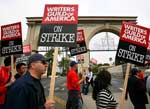
Don’t Let Writers Stand Alone – All Media Workers Should Join the WGA on Strike!
(December 2007).
click on photo for article
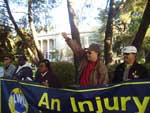
Militant Protest Against Racist Cop
Attack on Bay Area Longshore Workers (October 2007).
click
on photo for article
December 2008
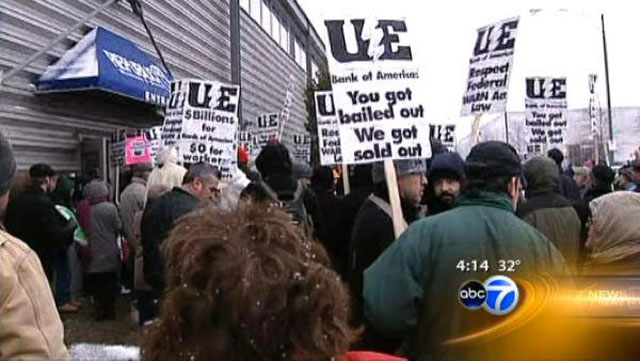
Take to the Streets!
On
Friday morning, December 5, the Bureau of Labor Statistics reported
that
U.S.
employers slashed 533,000 jobs in November. Taken together with the
BLS’
revised figures for jobs eliminated in September and October, that’s
1.2
million workers thrown onto the street in three months as the credit
crisis
turns into a full-fledged economic collapse. Curiously, the stock
market rose,
on the grounds that things were so bad that the government would have
to act.
At
almost the same hour as the jobs report was released in Washington, the
Republic Windows and Doors plant in Chicago was scheduled to close its
doors.
The owners had abruptly announced three days earlier that they were
shutting
down, and didn’t even show up for negotiations with the union, the
United
Electrical Workers (UE), the day before. But the furious 240 workers
refused to
take it lying down. They fought back, and showed the way to others.
At
10:30 a.m., the largely immigrant and black workers took over Republic
and
occupied the plant, vowing to hold fast until they won the vacation pay
and 60
days severance pay owed them under the Federal Worker Adjustment and
Retraining
Notification (WARN) Act. And they did. On the sixth day of the
occupation, J.P.
Morgan and the Bank of America, two of the biggest banks in the United
States,
forked over $1.75 million to pay for Republic’s legal obligations.
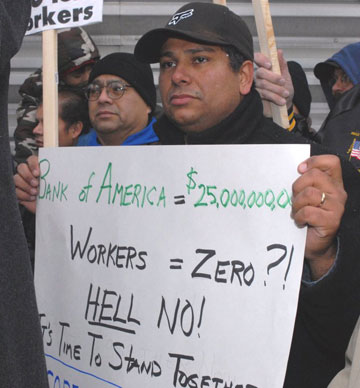 (Photo: Chris
Geovanis/Chicago Indymedia)
(Photo: Chris
Geovanis/Chicago Indymedia)
The
news of the occupation Friday spread like wildfire through the labor
movement.
TV reporters and crews broadcast the news of the spectacular action
around the
Chicago area. By the evening, trade unionists and other supporters were
showing
up at the plant, located in the Goose Island industrial area of North
Chicago,
bringing coffee, donuts and solidarity. The next day, news reports
reverberated
among labor and left activists nationally, and internationally.
From
plant floors to corporate boardrooms and broadcast studios, people had
their
eyes glued on the small plant in Chicago to see what happened. Everyone
was
well aware that this could be a harbinger of things to come as mass
layoffs
spread. If 200-plus workers could sit down and win, what would that
mean for
auto, where the United Auto Workers (UAW) is facing the shutdown of
dozens of
plants and tens of thousands of firings? Could the Republic sit-in
spark a wave
of labor struggle using militant tactics seldom seen since the ’30s?
The
sense of expectation was heightened by the shift in political climate
with the
election of Democrat Barack Obama to the White House on a platform of
“change”
from the despised regime of George Bush. “I have a lot of hope that
next year,
with a new president, he’ll make good decisions and invest money in
industry so
I can get another job as soon as possible,” one of the Republic
workers,
Apolinar Cabrena, told the media (AFP, 6 December). In reality,
unemployment is
going to get worse, a lot worse, under Obama as the capitalist crisis
deepens.
Another,
even more fundamental factor, was the sense among the workers that they
had
nothing to lose. With millions looking for work, the chances of finding
another
job soon were slim. Unemployment insurance isn’t enough to live on and
make
payments on home mortgages, car payments, credit card bills and medical
expenses. Plus it runs out after a period of months. Republic workers
remarked
that they could soon lose their homes as well as their jobs.
In
fact, with Obama still in Chicago before moving into the White House
next
month, the pressure on the Democratic president-elect to side with the
workers
was enormous. The giant Bank of America, which received $25 billion in
federal
bailout funds supposedly intended to encourage lending to businesses,
had
refused to roll over the credit line to the employer, who claimed he
couldn’t
paid the back wages. The BoA was seen as the Grinch Who Stole Xmas.
Meanwhile,
people showed up at the plant with donations of food for the workers, a
truckload
of toys for their children. Celebrities like Jesse Jackson showed up to
compare
the workers to civil rights hero Rosa Parks and Cesar Chavez. Illinois’
wheeler-dealer governor
Rod
Blagojevich made the scene to announce that he was ordering state
agencies to
stop business with Bank of America. (The next morning he was arrested
in his
home by federal agents on corruption charges.)
Beyond
the expressions of sympathy and grandstanding by the politicos, there
were
demonstrations of solidarity. The UE held a rally of over 1,000 in
downtown
Chicago on December 10, while Bank of America offices were picketed
nationwide
in support of the Republic workers. Internationally, messages of
solidarity
came from labor federations from Japan to Venezuela and France,
declaring,
“Your fight is our fight as millions of workers around the world are
suffering
from the economic crisis that affects more and more people every day.”
Negotiations
dragged on as the bankers claimed it wasn’t up to them to pay the
workers and
company management claimed they didn’t have the cash. But a little
digging by
reporters revealed that the owners of Republic Windows and Doors last
month set
up another company, Echo Windows and Doors, which in turn bought a
plant in
Iowa. Their intent was clearly to save on wages by shifting production
to the
non-union facility. They were already shipping machinery out in the
dead of
night and on weekends.
Republic
CEO Rich Gillman turns out to be a first-class villain who makes Gordon
Gekko
in the film Wall Street look like a do-gooder. Not only were
they taking
away the livelihoods of 240 workers and refusing to pay what they
legally owed
them, they didn’t declare bankruptcy at Republic until after
the plant
closure, so workers’ claims would come after other creditors.
And while
pleading poverty, Gillman demanded that any new bank loan also cover
the lease
of his BMW 350xi and Mercedes S500 luxury cars and pay eight weeks of
his
$225,000 salary!
They
Dared to Struggle, and Won
The
sit-in at Republic Windows and Doors didn’t just happen spontaneously.
A few
weeks earlier, as they kept a late-night lookout to see where machinery
from
the plant was being sent, Mark Meinster, a UE organizer, raised the
possibility
with Armando Robles, president of Local 1110 at the plant. By Friday,
when company
officials announced that they were not only shuttering the plant but
had
already cut off employees’ health insurance and were refusing to pay
the last
week’s work, the angry workers voted unanimously to occupy the factory.
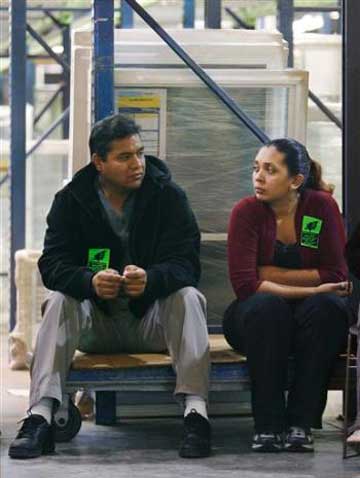 The
United Electrical Workers became the representative of Republic workers
in 2004
after they voted to decertify the Central States Joint Board, an outfit
long
run by Laborers Union leader John Serpico, who was notorious for
sweetheart
deals with the bosses, sweetheart loans from banks and close ties to
the
Chicago and Illinois Democratic political machine. The UE is relatively
more
democratic and feisty than the norm for American “business unionism,”
and last
spring organized a picket at the plant and presented a petition to
management
listing demands.
The
United Electrical Workers became the representative of Republic workers
in 2004
after they voted to decertify the Central States Joint Board, an outfit
long
run by Laborers Union leader John Serpico, who was notorious for
sweetheart
deals with the bosses, sweetheart loans from banks and close ties to
the
Chicago and Illinois Democratic political machine. The UE is relatively
more
democratic and feisty than the norm for American “business unionism,”
and last
spring organized a picket at the plant and presented a petition to
management
listing demands.
The
occupation itself had modest goals, to force the company and the banks
who
financed it to pay money that was legally owed the workers. UE
officials also
raised the possibility of finding another company to restart the plant
and there
was talk of running it under an ESOP (Employee Stock Ownership Plan),
as Avis
Rent-a-Car or United Airlines were for a time. The “worker ownership”
of such
arrangements is a fiction, making the workers responsible for their own
exploitation while management continues to run the company, fire
employees,
etc.
Various
leftists talked of “workers control,” citing the example of occupied
plants
like the Bruckman textile and Zanon ceramics plants in Argentina.
Workers in
those plants fought tenaciously to save their jobs in the face of
unscrupulous
bosses much like those at Republic Windows and Doors. But far from
being
workers control – which is dual power at the factory level, in which
workers
contest for power with the capitalists – these are essentially
cooperatives,
which with limited resources compete from a weak competitive position
on the
capitalist market.
The
real power the workers at Republic had was they were safeguarding the
facilities, finished products and equipment in the plant – or holding
them
“hostage,” as the bosses saw it – that were worth far more than the
$1.75
million owed them. After all, these were their tools and the products
of their
labor. If the banks had refused to settle, and no way was found to save
their
jobs, the workers could have demanded that the proceeds from any sale
of assets
be paid to them.
The
intrepid band of Republic workers were facing off not just against a
real
stinker of a boss but against major corporations. BoA is the closest
thing to a
nationwide bank in the United States, and it turns out (which had not
been
previously publicized), that 40 percent of the windows plant was owned
by the
JPMorgan Chase investment bank, whose Midwest chairman is William
Daley,
brother of Chicago’s Democratic mayor Richard M. Daley. The building
belongs to
the Wrigley chewing gum corporation, bought out last fall by the Mars
candy
conglomerate.
In
the end, Bank of America caved under the mountain of bad publicity,
shelling
out $1.35 million while JPMorgan threw in another $400,000. The workers
discussed the proposal and voted unanimously to accept it, pouring out
the
factory doors to proclaim to the waiting media, “We did it!” While some
leftists proclaimed it as a “resounding victory” (Socialist Worker,
11
December), the fact is that Republic workers are still out of a job,
with no
prospect of getting work. But it was definitely, as a UE official said,
“a
victory for workers everywhere.”
Fight
Layoffs with Militant Labor Action
What
does the Chicago workers courageous plant occupation mean for working
people
around the country? For one thing, Republic was an inspiring example of
solidarity of Latino and black workers, putting the lie to the bosses’
propaganda (repeated by some fake leftists) that immigrant workers are
too
cowed to be militant. Here the mainly immigrant workers set an example
of
audacious action for all labor in the U.S. Also on December 11, Latino
immigrant and black workers at the giant Smithfield hog processing
plant in Tar
Heel, North Carolina voted for the United Food and Commercial Workers
(UFCW)
after a bitter 14-year fight, overcoming management efforts to set
different
ethnic groups against each other (see box).
These
are signs of a shifting political climate, but despite the fervent
hopes for
“change” by many who voted for Barack Obama, the example of Republic
workers
will not simply multiply. As the capitalist crisis deepens, hard class
battles
are coming, in which the Democratic president will back the bosses.
This time,
as a small group of workers won national sympathy, Obama could make a
grand
gesture and declare that the workers were “absolutely right” in
demanding what
was legally owed to them. But while he is the first black president in
the
history of the United States, a country founded on slavery and marked
by racism
throughout its history, Obama represents not the mass of black poor
and
working people but the interests of capital.
If
other workers react to mass layoffs and plant closures by following the
example
of the Republic workers in Chicago, and they should, they will
be met
next time by a massive wall of repression and slander. Auto workers,
for whom
losing their job means they will likely never set foot in an auto plant
again,
will be portrayed as greedy and “privileged.” The pink slips from the
companies
will be backed up by an act of Congress ordering “restructuring” of the
industry.
Moreover,
the labor fakers who sit atop the United Auto Workers (UAW) are
actively
helping the Big Three (GM, Ford and Chrysler) and the incoming
Democratic administration
by agreeing in advance to rip up past gains and drive wages and
benefits down
by at least $10 an hour. The only question is when, in 2009 or 2010.
Already
new hires receive only $14.50 an hour and sharply limited benefits as a
result
of past givebacks.
While
the UE is better than most American unions in various respects, it
still plays
by the bosses’ rules, working within the legal framework set by the
ruling
class to hamstring labor action. In order to win battles on a large
scale,
workers must rip off that straitjacket and act according to their own
rules.
The stranglehold of the present misleaders of labor must be broken and
replaced
by a leadership with the program and determination do what it takes to
defeat
the bosses.
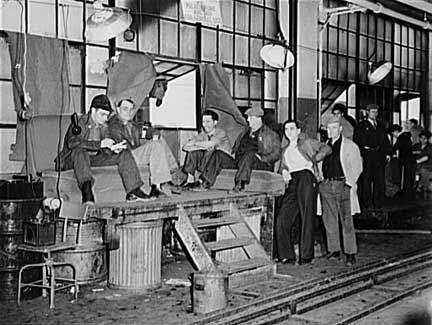 Auto
strikers guard window entrance to GM's
Fisher Body Plant #3 during 1937 sit-down strike. (Photo: Library of Congress)
Auto
strikers guard window entrance to GM's
Fisher Body Plant #3 during 1937 sit-down strike. (Photo: Library of Congress)
The
Republic plant occupation harked back to the 1937 General Motors
sit-down
strike in Flint, Michigan. The tactic had been used a year earlier by
rubber
workers in Akron, Ohio, and then by steel workers. But it was the
occupation of
Fisher Body and Chevrolet plants in Flint that laid the basis for the
UAW and
unionizing the mass production industries in the CIO (Congress of
Industrial
Organizations) unions. Flint was a pitched battle against police and
National
Guard, and without the leadership of communists and socialists it never
would
have won.
Other
militant tactics soon appeared: “flying pickets” (truckloads of
strikers to
stop scabs or spread the action); “hot-cargoing” (union workers
refusing to
handle scab goods); “solidarity strikes” (shutting down production in
support
of another union). Many of these were pioneered by supporters of the
Bolshevik
revolutionary Leon Trotsky in the Minneapolis Teamsters, who in 1934
led a
truckers strike that shut down the city. Other citywide general strikes
took
place the same year in Toledo, Ohio (auto parts) and San Francisco
(longshore).
All were led by “reds.”
But
in the “red purge” that drove militant leaders out of the unions after
World
War II, Congress passed the infamous Taft-Hartley “slave labor” law
that
outlawed these militant labor tactics. Today while the sellout AFL-CIO
and
“Change to Win” bureaucrats pin their hopes on passing the Employee
Free Choice
Act to unionize workers through a simple “card check,” we insist that
strong
unions can only be built by workers action independent of the
government, on
the picket lines and in the plants.
Jesse
Jackson talks of a “non-violent wake up call to America” and the need
for a
“bigger movement to resist economic violence.” If unions not only take
over
factories to protest layoffs and wage cuts, but also prepare to defend
them
against the forces of state repression as they did for 44 days at Flint
in 1937
– including with a Women’s Emergency Brigade led by the Trotskyist
Genora
Johnson on the front lines against the cops and company goons – this
talk of
“non-violence” will be turned against the workers. The struggle for workers
defense guards, as for plant occupations against layoffs and wage
cuts,
will require class-struggle leadership.
Such struggles can’t be waged on a
plant-by-plant basis. Plants facing
shutdown
are in a weak position to start with, since the bosses are already
losing money
on them. It is also necessary to unite the factories with the masses
of
unemployed in the black ghettos and Latino barrios in a common class
struggle
led by the most powerful sectors of the workers movement. In a real
battle,
strike action shutting down the Chicago commodities markets, the
transit
authority, steel and other industries would be key. Teachers unions
with
their
ties to the poor and working-class neighborhoods, and others can play
important
auxiliary roles. And again, this will not be accomplished by
business-as-usual
“business unionism.”
The
Internationalist Group emphasizes that any serious struggle against the
scourge
of unemployment in this developing depression will have to oust the
pro-capitalist bureaucrats and break from the Democrats. The ruling
class is
worried that after decades of socking it to labor, destroying unions
and
ripping up workers’ gains, it could be facing some serious unrest.
“We’re going
to have riots,” warned a Southern Senator in opposing the auto bailout.
But for
the unrest and resistance to roll back the bosses’ union-busting
offensive and
achieve victory, we need to forge a revolutionary workers party.
Ultimately,
as Karl Marx and Friedrich Engels wrote 160 years ago in the Communist
Manifesto, “every class struggle is a political struggle.” And the
fight to
abolish unemployment cannot be achieved under capitalism. Many liberals
and
reformists today talk of a “new New Deal,” as if the mounting job
losses, wage
cuts, evictions, homelessness and poverty could be resolved by a repeat
of
Franklin D. Roosevelt’s public works, social insurance and corporate
regulation
programs. But FDR’s programs didn’t end the Depression, World War II
did.
While
it was touched off by a housing bubble, credit crisis and stock market
panic,
underlying the present economic collapse is a classic crisis of
overproduction
reflecting the capitalists’ falling rate of profit. Trotskyists put
forward a
transitional program of demands –including for a shorter workweek
with no
loss in pay, to divide up the available work among all takers; for
workers
commissions to open the books of the giant corporations; for massive
public
works under union control – as part of an overall program leading to socialist
revolution, in the U.S. and worldwide.